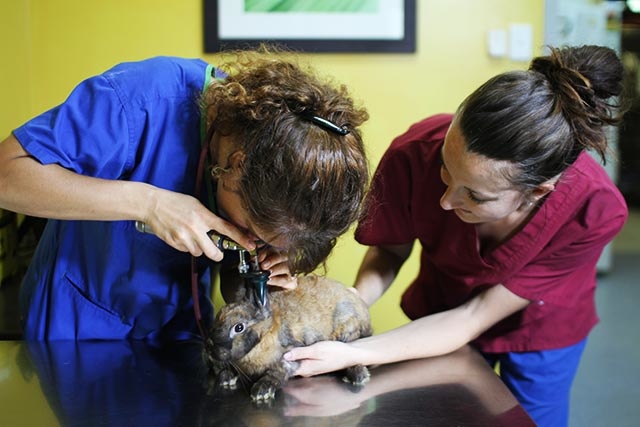How Often Should You Take Your Pet Rabbit For Vet Checkups?

As a pet owner it is important to ensure that your pet rabbit is happy and healthy and to spot any early problems as they arise. In order to do this you need to regularly take your pet rabbit to the vets for a check-up, for healthy rabbits, this is recommended to be at least once a year.
There are a number of key things that your vet will be looking for during each visit to make sure your rabbit is as healthy as can be. Firstly, the vet will take a look at your rabbit’s teeth and nails to ensure there are no abnormalities. A rabbit’s front teeth and nails grow really quickly so you should keep on top of these each week by filing your rabbit’s nails and giving him treats to gnaw on so that his teeth do not become too long or sharp. Your vet will only intervene if your rabbit has overgrown or misaligned teeth that require treatment, so it is your responsibility to maintain a rabbit’s teeth and nails between appointments.

Your vet will also ask you questions about your rabbit’s daily diet and routines. A healthy diet for your rabbit should consist of mostly hay or grass and plenty of water, and you should ensure that your rabbit is eating and drinking at least daily. Your rabbit should also regularly pass plenty of dry droppings which is another indicator to his overall health. In between check-ups if you notice your rabbits eating habits or toilet habits change, then you should consult your vet immediately as this could be a sign that something is wrong.
Renewing your rabbit’s vaccinations is important to do each year, particularly vaccinating against myxomatosis and Viral Haemorrhagic Disease, your vet will advise you how often your rabbit needs boosters for various vaccinations during your yearly visit.
As well as monitoring the weight and temperature of your pet rabbit, the vet will also check over all other parts of your pet’s body. Firstly, an examination of the mouth will be conducted looking particularly at the incisors, the molars and to check if there are any problems with the rabbit’s gums or lips.
The vet will then move on to your rabbit’s eyes, ensuring there are no abnormalities or discharge. Often the eyes can give a good indication of overall health so this is an important part of the appointment. Following this the vet will then check your rabbit’s ears for any obstructions or irritation as rabbits are prone to ear infections. If any debris is found lodged within the ears, the vet may send a sample off to be analysed for mites, bacteria or yeast in order to determine any necessary treatment.
Your rabbit’s fur and skin will then be checked for parasites, hair loss or damage to the skin caused by your rabbit scratching or biting himself. The legs and joints will also be checked for unusual lumps or hair loss and finally the vet will use a stethoscope to listen to your rabbit’s heart and lungs.
Depending on your vet, these health, dental, weight and skin checks will often be free as it is important to catch these issues early before they worsen.
If your rabbit has not yet been spayed or neutered, then your vet may also discuss the benefits that this offers your rabbit. Finally, the vet will take blood and urinary samples for laboratory testing to check for diseases or conditions that may not be apparent during the physical exam.
So, whilst a healthy rabbit only needs to be seen by a vet annually, remember to monitor your pet for any abnormalities or changes between appointments whilst also keeping up with your rabbit’s nail and tooth growth.
